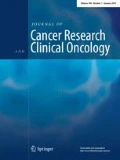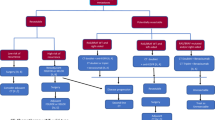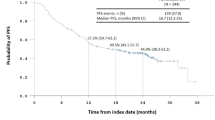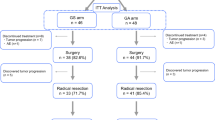Abstract
Introduction
Patients (pts) with locally advanced (LAPC) or metastatic pancreatic ductal adenocarcinoma (mPDAC) have a dismal prognosis. Recently, new combination chemotherapies such as FOLFIRINOX and nab-paclitaxel/gemcitabine have demonstrated superiority over gemcitabine monotherapy. However, a substantial proportion of pts cannot tolerate these intensive front-line protocols. Moreover, the long-term superiority of multiagent protocols over less intensive strategies remains to be shown. To provide a benchmark for future studies, we analyzed the outcome of patients with LAPC or mPDAC treated at the West German Cancer Center before the FOLFIRINOX/nab-paclitaxel + gemcitabine era.
Methods
This retrospective analysis included 201 consecutive pts with LAPC and mPDAC treated between 2007 and 2011. Efficacy parameters were correlated with type of chemotherapy, number of treatment lines and clinicopathological parameters.
Results
Gemcitabine monotherapy was given as first-line therapy in 51.1%, whereas 48.9% received combination chemotherapies such as gemcitabine/oxaliplatin or FOLFOX. Patients received a median of two lines of treatment, with 54.8% receiving second-line and 37.9% receiving third- and further-line therapies. There was no significant difference between gemcitabine monotherapy and combination therapies. Despite moderate activity of first-line treatment, median overall survival for LAPC was 11.3 months and 8.7 months for mPDAC. Multivariate analysis identified age and number of treatment lines as prognostic markers.
Conclusion
The long-term outcome of unselected pts with LAPC and mPDAC treated before the introduction of aggressive multiagent chemotherapy protocols compares favorably with the results of contemporary benchmark trials. This suggests a multifactorial benefit from interdisciplinary care provided over sequential treatment lines at high volume expert centers.








Similar content being viewed by others
References
Bosman FT, Carneiro F (2010) WHO Classification of Tumours of the Digestive System (World Health Organization Classification of Tumours, Volume 3) WHO Classification of Tumours
Brodowicz T, Wolfram RM, Kostler WJ et al (2000) Phase II study of gemcitabine in combination with cisplatin in patients with locally advanced and/or metastatic pancreatic cancer. Anticancer Drugs 11:623–628
Burris HA, Moore III, Andersen MJ J et al (1997) Improvements in survival and clinical benefit with gemcitabine as first-line therapy for patients with advanced pancreas cancer: a randomized trial. J Clin Oncol 15:2403–2413
Conroy T, Desseigne F, Ychou M et al (2011) FOLFIRINOX versus gemcitabine for metastatic pancreatic cancer. N Engl J Med 364:1817–1825
Dragovich T, Huberman M, Von Hoff DD et al (2007) Erlotinib plus gemcitabine in patients with unresectable pancreatic cancer and other solid tumors: phase IB trial. Cancer Chemother Pharmacol 60:295–303
Eisenhauer EA, Therasse P, Bogaerts J et al (2009) New response evaluation criteria in solid tumours: revised RECIST guideline (version 1.1). Eur J Cancer 45:228–247
Ghosn M, Farhat F, Kattan J et al (2007) FOLFOX-6 combination as the first-line treatment of locally advanced and/or metastatic pancreatic cancer. Am J Clin Oncol 30:15–20
Gill S, Ko YJ, Cripps C, Beaudoin A et al (2016) PANCREOX: a randomized phase iii study of fluorouracil/leucovorin with or without oxaliplatin for second-line advanced pancreatic cancer in patients who have received gemcitabine-based chemotherapy. J Clin Oncol 34(32):3914–3920
Heinemann V, Wilke H, Mergenthaler HG et al (2000) Gemcitabine and cisplatin in the treatment of advanced or metastatic pancreatic cancer. Ann Oncol 11:1399–1403
Heinemann V, Quietzsch D, Gieseler F et al (2006) Randomized phase III trial of gemcitabine plus cisplatin compared with gemcitabine alone in advanced pancreatic cancer. J Clin Oncol 24:3946–3952
Jemal A, Siegel R, Xu J et al (2010) Cancer statistics. CA Cancer J Clin 60:277–300
Louvet C, Labianca R, Hammel P et al (2005) Gemcitabine in combination with oxaliplatin compared with gemcitabine alone in locally advanced or metastatic pancreatic cancer: results of a GERCOR and GISCAD phase III trial. J Clin Oncol 23:3509–3516
Moore MJ, Goldstein D, Hamm J et al (2007) Erlotinib plus gemcitabine compared with gemcitabine alone in patients with advanced pancreatic cancer: a phase III trial of the National Cancer Institute of Canada Clinical Trials Group. J Clin Oncol 25:1960–1966
Neoptolemos JP, Palmer DH, Ghaneh P et al (2017) Comparison of adjuvan gemcitabine and capecitabine with gemcitabine monotherapy in patients with resected pancreatic cancer (ESPAC-4): a multicentre, open-lable, randomised, phase 3 trial. Lancet 389(10073):1011–1024
Oettle H, Richards D, Ramanathan RK et al (2005) A phase III trial of pemetrexed plus gemcitabine versus gemcitabine in patients with unresectable or metastatic pancreatic cancer. Ann Oncol 16:1639–1645
Oettle H, Riess H, Stieler JM et al (2014) Second-line oxaliplatin, folinic acid, and fluorouracil versus folinic acid and fluorouracil alone for gemcitabine-refractory pancreatic cancer: outcomes from the CONKO-003 trial. J Clin Oncol 32:2423–2429
Okusaka T, Ishii H, Funakoshi A et al (2006) A phase I/II study of combination chemotherapy with gemcitabine and 5-fluorouracil for advanced pancreatic cancer. Jpn J Clin Oncol 36:557–563
Pelzer U, Schwaner I, Stieler J et al (2011) Best supportive care (BSC) versus oxaliplatin, folinic acid and 5-fluorouracil (OFF) plus BSC in patients for second-line advanced pancreatic cancer: a phase III-study from the German CONKO-study group. Eur J Cancer 47:1676–1681
Rahma OE, Duffy A, Liewehr DJ et al (2013) Second-line treatment in advanced pancreatic cancer: a comprehensive analysis of published clinical trials. Ann Oncol 24:1972–1979
Saif MW (2013) Advancements in the management of pancreatic cancer. JOP 14:112–118
Therasse P, Arbuck SG, Eisenhauer EA et al (2000) New guidelines to evaluate the response to treatment in solid tumors. European Organization for Research and Treatment of Cancer, National Cancer Institute of the United States, National Cancer Institute of Canada. J Natl Cancer Inst 92:205–216
Von Hoff DD, Ervin T, Arena FP et al (2013) Increased survival in pancreatic cancer with nab-paclitaxel plus gemcitabine. N Engl J Med 369:1691–1703
Von Hoff DD, Goldstein D, Renschler MF (2014) Albumin-bound paclitaxel plus gemcitabine in pancreatic cancer. N Engl J Med 370:479–480
Wang-Gillam A, Li CP, Bodoky G et al (2015) Nanoliposomal irinotecan with fluorouracil and folinic acid in metastatic pancreatic cancer after previous gemcitabine-based therapy (NAPOLI-1): a global, randomised, open-label, phase 3 trial. Lancet 387:545–557
Xiong HQ, Rosenberg A, LoBuglio A et al (2004) Cetuximab, a monoclonal antibody targeting the epidermal growth factor receptor, in combination with gemcitabine for advanced pancreatic cancer: a multicenter phase II Trial. J Clin Oncol 22:2610–2616
Xiros N, Papacostas P, Economopoulos T et al (2005) Carboplatin plus gemcitabine in patients with inoperable or metastatic pancreatic cancer: a phase II multicenter study by the Hellenic Cooperative Oncology Group. Ann Oncol 16:773–779
Funding
No funding was received for this study.
Author information
Authors and Affiliations
Corresponding author
Ethics declarations
Conflict of interest
All authors declare that there are no conflicts of interest in relation to this study.
Ethical approval
All procedures performed in this study were in accordance with the ethical standards of the institutional research committee and with the 1964 Helsinki declaration and its later amendments or comparable ethical standards.
Informed consent
A retrospective study does not allow the retrospective obtaining of patient´s informed consent (ICF) from deceased patients. Against this background, the study was approved by the local Ethics Committee of the Medical Faculty of the University Duisburg-Essen (No. 15-6497).
Electronic supplementary material
Below is the link to the electronic supplementary material.
Suppl. Fig. 1
Kaplan–Meier plot for overall survival (OS) since start of palliative therapy in patients with low (A) or high (B) tumor burden (tumor target sum – TTS <mean or >mean), which received different number of chemotherapy lines. Median OS of patients with TTS<mean and one therapy line: 8.0 months, patients with two therapy lines: 14.4 months and patients with three or more therapy lines 18.5 months (p=0.035 log rank). Median OS of patients with TTS>mean and one therapy line: 4.0 months, patients with two therapy lines: 9.6 months and patients with three or more therapy lines 12.8 months (p=0.005 log rank). (TIF 63 KB)
Rights and permissions
About this article
Cite this article
Abendroth, A., Noureddine, R., Abramczyk, M. et al. Long-term outcome of patients with advanced pancreatic cancer treated with sequential chemotherapies before the era of modern combination therapy protocols. J Cancer Res Clin Oncol 145, 445–455 (2019). https://doi.org/10.1007/s00432-018-2789-z
Received:
Accepted:
Published:
Issue Date:
DOI: https://doi.org/10.1007/s00432-018-2789-z




